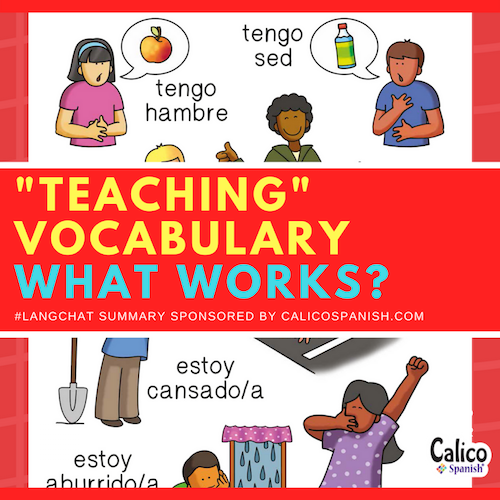“Teaching” Vocabulary – What works?
The #LangChat discussion on Feb 3rd was full of ideas and discussion on “Rethinking the ‘teaching’ of vocabulary.” We had a great group of participants sharing ideas, links and insights. After all, this is a group of language educators and “they” have a lot to say (as noted by @tmsaue1.)
– Follow the blog on Bloglovin –

Key points:
Teaching vocabulary words in the traditional list format does not create communicators. We have to introduce new vocabulary in contexts that are relevant to students. @DonaKimberly asked, “Do they learn the vocab because they want to or because there’s a test?” and @tmsaue1 replied, “Ideally because they realize that they NEED the vocabulary to communicate.”
– Like Calico Spanish on Facebook –
Great suggestions to find new words in situations and places that motivate and engage students included:
- Twitter
- Follow tweets in TL and also have students tweet in TL.
- @iVenus – “when I did my research on learning Italian w/ Twitter, my students who tweeted frequently had a more developed vocab” also, “tweets are “comprehensible input” as students intake new vocab, then produce output using new words
- Music
- YouTube, iTunes, CDs, Radio, etc.
- News Articles
- Free Reading
- novels, graphic novels, comics, children’s books, Facebook posts, etc.
- these books were recommended to me as “easy” http://bit.ly/ck03yA – @SECottrell
- Relay.com (French digital magazines) allows you to search by topic. Great for current articles – @mme_henderson
- Teaching time? Look at Renfe schedules. Teaching weather? Check out weatherbug.com – @DonaKimberly
- important to find texts w/ only 20% new vocab. That seems to be my kids’ limit. otherwise, frustration. – @bselden
- International corporate websites
- Discussion on making food discussions relevant, some said they’ve used McDonald’s international websites to compare and contrast foods offered in other countries.
- Google Search
- Find texts, articles, videos, realia, by reading level using advanced search@maestrachevre
- Humor
- @ZJonesSpanish was complimented for creating lots of resources using humor. See his site with great resources to learn Spanish via pop culture: http://zachary-jones.com/zambombazo/
– Follow Calico Spanish on Twitter –
Many educators are moving away from textbook use, but others experience a great deal of pressure to continue the use of textbooks. Vocabulary lists and memorization are easy to assign and assess, but the drill method of learning words outside of meaningful context doesn’t lead students to acquire language skills that lead to communicative output. For more indepth thoughts on this topic, see @SECottrell’s blog post “Do something drastic – kick the vocab quiz” http://bit.ly/dESeV0
- @SECottrell I never “teach” vocab. I give them the vocab, & then we use language.
- @SECottrell Supporting instruction with pleasure reading can feed high-frequency words/phrases into ur/their vocab too
- @cybraryman1: I always had my students create their own dictionaries (with pictures) when they learned new words; Also, my Flashcards page: http://bit.ly/9VF3z0
- @tonitheisen: they need to create with new voc too. @NinaTanti1: That’s why I love them to create stories…
Several tweets discussed how we can increase collaboration to help teachers move beyond and away from textbooks and towards thematic units of high interest to students. Engaging students in lessons full of meaningful content is the key to success. There are some excellent teachers collaborating via wikis to ensure all teachers have access to great content.
- @DiegoOjeda66: Wiki for LangChat and teacher resource collaboration: http://languageteacherscollaborate.pbworks.com
- @DonaKimberly: Central IA is creating a regional curriculum!
- @SraSpanglish: Here’s another wiki with lessons already being shared http://bit.ly/eW34MX
- @Alli_Flowers: #langchat Another awesome source for lesson plans: http://bit.ly/fR8Y9U
- @Spanishtech: Well, we could actually contribute to a collaborative text like…http://en.wikibooks.org/wiki/Spanish_by_Choice
Having students create portfolios to show acquisition, use the language in meaningful ways and create content for assessments was mentioned by several. Some teachers are using Google Sites and others are having students take notes with Google Docs. @bselden was kind enough to share a link to her site. Scroll to the bottom for links to student portfolios. http://mysite.cherokee.k12.ga.us/personal/brittany_selden/site/pages/French%201.aspx
Thank you to all the participants in our #LangChat. What an amazing group of people! Join us weekly on Twitter, Thursdays at 8ET.
Vote on the topic for Feb 10, 2011 at TwtPoll.
See the complete archive of the Feb 3 #LangChat here.
Please visit the Language Teachers Collaborate Wiki for more great resources collected during #LangChat and beyond.
– Follow us on Instagram too! –






2 Comments
Amazing summary Erica – thanks!
I use pbworks as a portfolio “holder” for my students. Let me know if you can’t see it. Email me at tamara.linares@cherokee.k12.ga.us
http://ehsspanish3h.pbworks.com/w/page/31819863/FrontPage
Go to the right side of the page, click on a student’s name.